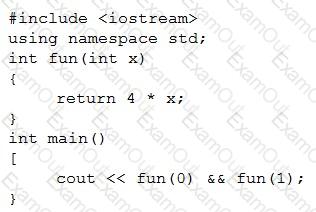What is the output of the program?
#include
#include
using namespace std;
int main()
{
string s1[]= {"H" , "t" };
string s;
for (int i=0; i<2; i++) {
s = s1[i];
s.insert(1,"ow");
cout << s;
}
return( 0 );
}
What happens when you attempt to compile and run the following code?

What is the output of the program?
#include
using namespace std;
#define SQR(x)(x*x)
int main(int argc, char *argv[]) {
int x, y=2;
x = SQR(y);
cout << x << ", " < return 0; }
What will happen when you attempt to compile and run the following code?
#include
using namespace std;
#define A 1
int main()
{
#if A
cout<<"Hello";
#endif
cout<<"world";
return 0;
}
What happens when you attempt to compile and run the following code?
#include
using namespace std;
class complex{
double re;
double im;
public:
complex() : re(0),im(0) {}
complex(double x) { re=x,im=x;};
complex(double x,double y) { re=x,im=y;}
void print() { cout << re << " " << im;}
};
int main(){
complex c1;
c1.print();
return 0;
}
What happens when you attempt to compile and run the following code?
#include
#include
using namespace std;
class SampleClass
{
string *s;
public:
SampleClass() { s = new string("Text");}
SampleClass(string s) { this?>s = new string(s);}
~SampleClass() { delete s;}
void Print(){ cout<<*s;}
};
int main()
{
SampleClass *obj;
obj = new SampleClass("Test");
obj?>Print();
}
What happens when you attempt to compile and run the following code?
#include
#include
using namespace std;
class complex{
double re;
double im;
public:
complex() : re(1),im(0.4) {}
bool operator==(complex &t);
};
bool complex::operator == (complex &t){
if((this?>re == t.re) && (this?>im == t.im))
return true;
else
return false;
}
int main(){
complex c1,c2;
if (c1==c2)
cout << "OK";
else {
cout << "ERROR";
}
}
What happens when you attempt to compile and run the following code?

What happens when you attempt to compile and run the following code?
#include
using namespace std;
void set(struct person*);
struct person
{
char name[25];
int age;
};
int main()
{
struct person e = {"Steve", 30};
set(&e);
cout<< e.name << " " << e.age;
return 0;
}
void set(struct person *p)
{
p?>age = p?>age + 1;
}
What happens when you attempt to compile and run the following code?
#include
#include
using namespace std;
int main()
{
string s1[]= {"H" , "t" };
string s;
for (int i=0; i<2; i++) {
s = s1[i];
s.insert(1,"o");
cout << s;
}
return( 0 );
}

